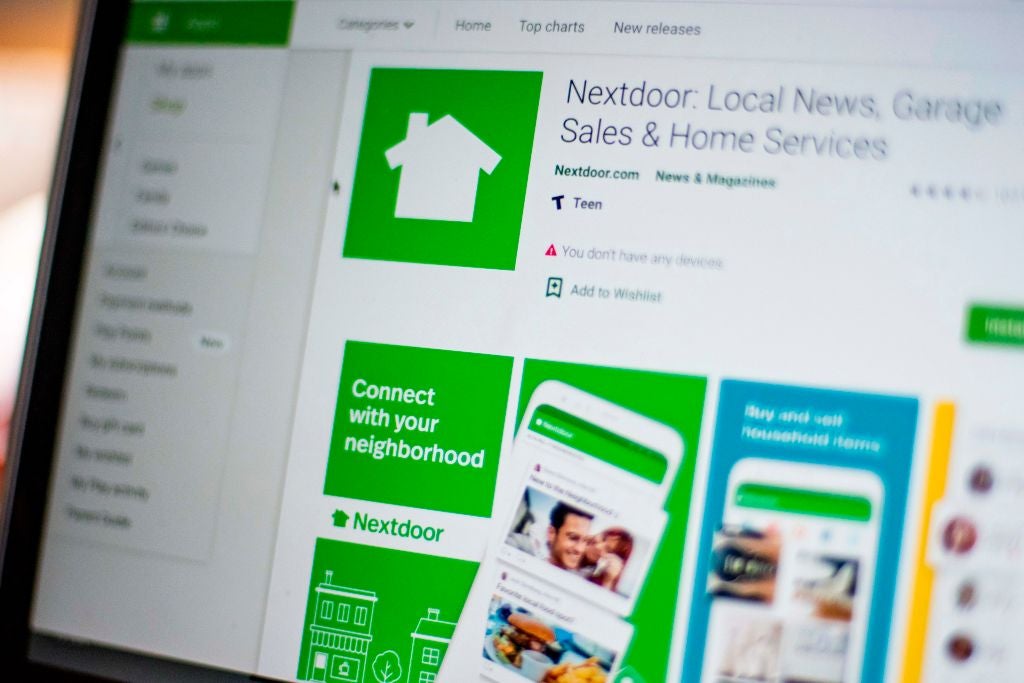How Nextdoor became a place for Covid vaccine misinformation
The app’s CEO said it wanted to curb “toxic-type” content, but users report many conspiracy posts remain on the platform

Support truly
independent journalism
Our mission is to deliver unbiased, fact-based reporting that holds power to account and exposes the truth.
Whether $5 or $50, every contribution counts.
Support us to deliver journalism without an agenda.

Louise Thomas
Editor
Social media's penchant for becoming a delivery vehicle for misinformation has not spared Nextdoor, the app that bills itself as an effective way to stay in touch with your neighbours, promote community events and bolster local safety.
Jane Elizabeth wrote an essay for Harvard-based NeimanLab explaining her experience using Nextdoor and how she believes it is "overlooked as a player in misinformation”.
She said that in order to address "vaccine hesitancy" in the US, it may be necessary to "start at the neighborhood level, where hesitancy has grown into militancy”.
Nextdoor is social media network that emphasizes neighbourhood-level engagement. In order to join a neighbourhood group, users must prove they actually live in the area. The idea at the heart of the app is to link neighbours with each other to facilitate better connectivity within communities.
The app has steadily grown in popularity since its launch, particularly as the coronavirus kept people hunkered down at home in 2020. Axios reported that its user base grew more than 60 per cent during the onset of the pandemic in the US.
Nextdoor claims it is now present in one of every three households in the US and 11 other countries.
The app operates largely as advertised; on a given day users may see a post from one neighbor trying to sell a dresser, another looking for a dog walker, and another promoting a farmers market or fundraiser.
But the app has also attracted the same conspiracy-leaning fare that is common on other social media platforms like Facebook and Twitter.
Ms Elizabeth said she took to Nextdoor to try to help elderly people in her neighborhood to navigate the state's process for receiving the coronavirus vaccine, but was met with resistance from conspiracy-minded community members.
She claimed that her posts advertising help to get the vaccine were the subject to personal attacks from QAnon believers and anti-vaxxers.
When her county health officials posted public service announcements regarding new vaccine clinics, the conspiracy theorists came out in droves to try to shout it down and flood its comment section with links to dubious "research" casting doubt on the shot.
Users yelled at others to "do your own research" and called them "sheeple" for wanting to be vaccinated from a virus that has killed roughly 600,000 people in the US. At least one user even likened the vaccine to the Biblical "Mark of the Beast”.
Ms Elizabeth pointed out that the posts explicitly violate Nextdoor's own policies on misinformation. The company's policy bans false or misleading claims about the causes, cures, prevention, testing, safety and treatment of the coronavirus or anything "that could prevent or discourage people from receiving vaccines”.
She said she reported some posts, which were removed, but said that others remain.
Daniel Acosta Ramos, an investigative reporter with First Draft who studied misinformation on Nextdoor during the 2020 election, told Ms Elizabeth that the app gets away with leaving up conspiracy posts because posts do not get the same views that they might on a larger platform like Facebook, and the apps geofence feature prevents researchers from seeing posts outside of their own neighborhoods.
Colorado Public Radio reported similar findings, citing a situation in which a neighbourhood in Aurora, Colorado was told by Nextdoor users that "scammers" were going door-to-door and to ignore them.
The "scammers" were part of COVIDCheck, a legitimate organisation that worked to provide people with help during the pandemic.
As a result of the lies spread by the conspiracy theorists, neighbours may have missed out on valuable information on how to access the vaccine or other Covid assistance programs.
Users suggested the COVIDCheck members were "casing" houses and told neighbors to "notify the police”.
Nextdoor's CEO Sarah Friar told Axios that the platform has "made a long-term decision that we'd rather not have the spikes on engagement from toxic-type content”.
Ms Elizabeth reached out to the company about the numerous posts she reported that are still active on the app, and was told by a company representative that "Nextdoor is investigating the delay in addressing the comment reports”.
Subscribe to Independent Premium to bookmark this article
Want to bookmark your favourite articles and stories to read or reference later? Start your Independent Premium subscription today.
Join our commenting forum
Join thought-provoking conversations, follow other Independent readers and see their replies
Comments